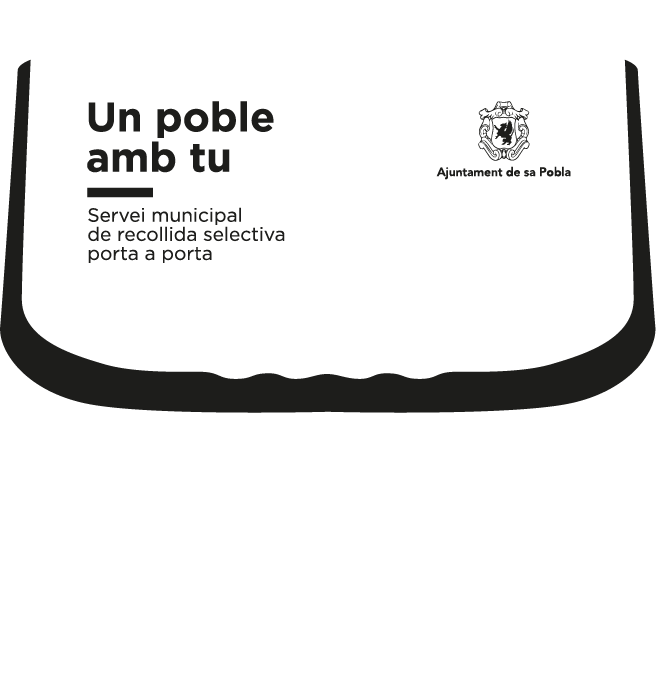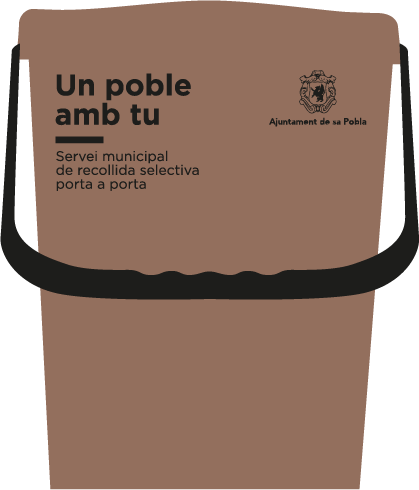How will door-to-door collection work in Sa Pobla?
Each day, you must leave the type of waste stated in the calendar outside your front door. Remember: it is important to properly separate it, otherwise the collection service will not be able to collect the bag.
Also, the different types of waste collected in Sa Pobla will increase because the separate collection of organic matter is being introduced. This means that the frequency of general waste collection is limited to one day per week. Thanks to your correct management of the waste produced, there will be greater separation of waste.
What will door-to-door collection be like for businesses?
The door-to-door collection service will be more frequent for businesses and professionals. Since they generate a large amount of waste, they have large and small bins to make it as convenient as possible for them to put the waste out on the right days.
What day should I put out each kind of waste?
The first thing to highlight is that there will be two different collections: one for homes and the other for large waste producers


![]()
Packaging:
cartons, bottles, cans, jars and plastic bags, film, polystyrene, aerosols and metal, plastic or white cork caps..
![]()
Sanitary products:
nappies, wipes, sanitary towels, cotton buds, animal droppings and cat litter.
![]()
General waste:
clay, porcelain, ashes, cigarette butts, animal droppings, razorblades, toothbrushes, painted/drawn-on paper, mirrors, glasses, cups, vacuum cleaner bags, scouring pads, sweepings, used pens and pencils, rubbers and pencil sharpeners, paperclips, clothes hangers, laminated paper, photographs and sticky tape.
![]()
Organic matter:
leftovers from fruit, vegetables, meat, fish, baked goods, pastries or food, eggshells, seafood, used coffee (without capsules), teabags, kitchen paper or napkins, toothpicks, corks and household paper towels.
![]()
Glass:
glass bottles and glass jars without the tops.
![]()
Paper and cardboard:
magazines, newspapers, paper plates and cups, wrapping paper and cardboard boxes.
What if I live outside of town?
Only people who live in the countryside can use these contribution areas, as each one covers a part of the out-of-town areas. You will need a waste collection point card to use it, which you can get at the waste collection point itself for free. They are open 24 hours a day, seven days a week, and there will be entry checks and CCTV. In addition, anyone who lives in Sa Pobla can take their waste to the waste collection point during the normal timetable.
The Waste Inspection Service (ITR) offers you a discount off the waste collection charge
The ITR (Waste Inspection Service) is a voluntary scheme offering discounts off the waste collection charge that the Environmental Department of Sa Pobla Town Council launched in 2017. This scheme is for both homes and large waste producers (shops, companies, etc.), so if you would like the Town Council to give you a financial discount for separating waste properly, simply sign up for the ITR by filling in this form.
These inspections will check that you are properly separating your waste. When you sign up for the ITR, you will consent to the environmental inspector carrying out the check. In return, you will get a 30% discount off the waste collection charge.
You can sign up at any time during the year, but if you want the discount to take effect during the current year, you need to sign up between 1 January and 28 February each year.

Recommendations to reduce waste

As we all know, the best waste is waste that is never produced, so Sa Pobla Town Council has launched various initiatives to cut waste under the slogan Objective Zero Waste 0 (Objectiu Residu 0 – R0). But you can also help to reduce the major problem caused by waste and its treatment by cutting the amount of waste you produce at home. Here are some tips:
These actions that you can take in your everyday life show a firm commitment to improving the environment.
Hello,
white bin!




Hello,
brown bin!
